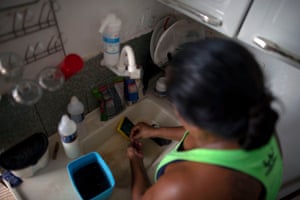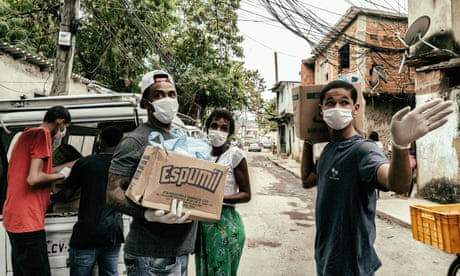Millions of domestic workers have been told to keep working or been laid off without pay. Now their families are fighting back against a ‘structurally racist’ system
Jo Griffin@jogriffin2 THE GUARDIAN Tue 5 May 2020


A campaign called ‘for the lives of our mothers’ is demanding maids be given paid leave from work. Photograph: Dado Galdieri/Bloomberg/Getty
For as long as Juliana França can remember, on weekdays her mother, Caterina, has made the four-hour round bus trip from the working-class area of Baixada Fluminense, outside Rio de Janeiro, to the city’s affluent South Zone to work as a maid.
But when Covid-19 arrived in Brazil, França begged her to stay at home.
“I was afraid. I called her pleading with her not to go. I was crying,” says França. She feared her 57-year-old mother’s life could be at risk if she kept going to work at two different homes, but knew she would lose her income if she didn’t.
França rallied the sons and daughters of other maids to launch the campaign “for the lives of our mothers”, with a manifesto calling for guaranteed protection for the health and jobs of the country’s domestic workers during the pandemic.
Their petition demanding that all of Brazil’s maids – mainly poor, mostly black women – be granted immediate “paid quarantine” has gathered more than 87,000 signatures and touched a nerve in a country where the working arrangements for maids are often seen as a legacy of slavery and reflection of deep inequality.
The campaign comes amid a furious debate about class and privilege in Brazil after 63-year-old housekeeper Cleonice Gonçalves became the first person in Rio to die of coronavirus, which she is believed to have caught from her employer in the upmarket area of Leblon. Her employer had reportedly just returned from holiday in Italy but Gonçalves had no idea that she was ill and was not offered the chance to stay away.
Since then domestic workers across the country have shared stories of employers arbitrarily dismissing them, or giving them orders such as, “Just come at a different time so you can avoid rush hour”, or refusing to stick to health guidelines. Some say their employers have demanded they move in to ensure they don’t get infected elsewhere, even though this would mean leaving their own families.
“My boss wouldn’t let me go [stay off work] so I could stay at home and not get this disease. But neither did she buy a mask or alcohol [sanitiser],” writes one woman in a Facebook group for domestic maids that has 162,000 followers.
Domestic workers in Brazil often face prejudice and lack job protection. Photograph: Mauro Pimentel/AFP
Another writes: “I’m at home. My boss let me go so I wouldn’t pass on the virus [if I got it] but she told me she wasn’t going to pay me for the time I was off. I don’t know what to do … Can she really do that – send me home and not pay my wages?”
The day after Gonçalves died, the government recommended that employers put domestic workers on paid leave from all but “indispensable” services. A provisional law has been introduced allowing employers to reduce maids’ hours and suspend their contracts for up to 60 days, with an emergency fund to cover loss of income.
However, some employers insist that domestic workers keep providing the services they don’t want to take care of themselves. The situation is especially precarious for the millions of domestic workers without formal papers, including more than 2 million diaristas (daily workers), whose average wage of 120 reais (£17) a day may sustain their whole family.
Brazil has more domestic workers than any any other country – over 7 million. Maids have steadily gained rights in recent years, and in 2018 the country ratified the International Labour Organization convention on domestic workers. But legal loopholes have left many working without the formal status that protects them. Prejudices towards maids are laid bare on sites like A Minha Empregada, which retweets insults and criticism made by those they work for.
Our bodies are affected daily by this racist societyJuliana França
The national union of domestic workers (Fenetrad) has stressed the danger many are now facing. “Domestic workers are among those most exposed to the risks of contracting Covid-19. They use public transport, are in regular contact with others … and don’t have the option of working from home, especially daily maids.
“They earn on average less than the minimum wage and only around 30% have a formal contract, leaving them more exposed to abuse and violation of their rights.”
Underpinning this vulnerability, says França, is racism. “We have a history of almost four centuries of slavery in this country. That means that in 2020, we live in a society that is structurally racist. You are going to say to me: ‘But I didn’t enslave anyone’, but you benefit from the privileges inherited through this context of slavery. Just as our bodies – black and from the periphery – are affected daily by this racist society.”
Volunteers in Rio’s Santa Marta favela have been working to sanitise the streets. Diaristas who travel from the slums on public transport to work on multiple sites, are vulnerable to infection. Photograph: Léo Corrêa/AP
In an article for the daily newspaper Folha de São Paulo, the former maid turned rapper and author known as Preta Rara wrote: “Who do the lives of domestic workers matter to, apart from themselves and their families? They want our labour at any cost but they have no empathy with our lives.”
During the pandemic, this lack of empathy could cost lives, she wrote. “This is the moment to practise empathy for someone who has spent their life leaving everything clean and organised for you and your family. In the era of the pandemic, empathy will be vital to stop the spread of disease.”

'We're abandoned to our own fate': coronavirus menaces Brazil's favelas
https://www.theguardian.com/global-development/2020/apr/14/were-abandoned-to-our-own-luck-coronavirus-menaces-brazils-favelas
After Caterina’s employers were shown the manifesto from França’s campaign, they agreed to give her paid time off. “She is safe at home, though anxious about the virus,” says França, who believes her campaign will help usher in lasting change for domestic workers.
“When we have gone through this pandemic, we will be stronger in our demand for the rights for domestic workers because this situation has proven how these women, especially daily maids, are neglected by the state. We will secure a law that ensures proper support for domestic workers in future situations like this.”
For as long as Juliana França can remember, on weekdays her mother, Caterina, has made the four-hour round bus trip from the working-class area of Baixada Fluminense, outside Rio de Janeiro, to the city’s affluent South Zone to work as a maid.
But when Covid-19 arrived in Brazil, França begged her to stay at home.
“I was afraid. I called her pleading with her not to go. I was crying,” says França. She feared her 57-year-old mother’s life could be at risk if she kept going to work at two different homes, but knew she would lose her income if she didn’t.
França rallied the sons and daughters of other maids to launch the campaign “for the lives of our mothers”, with a manifesto calling for guaranteed protection for the health and jobs of the country’s domestic workers during the pandemic.
Their petition demanding that all of Brazil’s maids – mainly poor, mostly black women – be granted immediate “paid quarantine” has gathered more than 87,000 signatures and touched a nerve in a country where the working arrangements for maids are often seen as a legacy of slavery and reflection of deep inequality.
The campaign comes amid a furious debate about class and privilege in Brazil after 63-year-old housekeeper Cleonice Gonçalves became the first person in Rio to die of coronavirus, which she is believed to have caught from her employer in the upmarket area of Leblon. Her employer had reportedly just returned from holiday in Italy but Gonçalves had no idea that she was ill and was not offered the chance to stay away.
Since then domestic workers across the country have shared stories of employers arbitrarily dismissing them, or giving them orders such as, “Just come at a different time so you can avoid rush hour”, or refusing to stick to health guidelines. Some say their employers have demanded they move in to ensure they don’t get infected elsewhere, even though this would mean leaving their own families.
“My boss wouldn’t let me go [stay off work] so I could stay at home and not get this disease. But neither did she buy a mask or alcohol [sanitiser],” writes one woman in a Facebook group for domestic maids that has 162,000 followers.

Domestic workers in Brazil often face prejudice and lack job protection. Photograph: Mauro Pimentel/AFP
Another writes: “I’m at home. My boss let me go so I wouldn’t pass on the virus [if I got it] but she told me she wasn’t going to pay me for the time I was off. I don’t know what to do … Can she really do that – send me home and not pay my wages?”
The day after Gonçalves died, the government recommended that employers put domestic workers on paid leave from all but “indispensable” services. A provisional law has been introduced allowing employers to reduce maids’ hours and suspend their contracts for up to 60 days, with an emergency fund to cover loss of income.
However, some employers insist that domestic workers keep providing the services they don’t want to take care of themselves. The situation is especially precarious for the millions of domestic workers without formal papers, including more than 2 million diaristas (daily workers), whose average wage of 120 reais (£17) a day may sustain their whole family.
Brazil has more domestic workers than any any other country – over 7 million. Maids have steadily gained rights in recent years, and in 2018 the country ratified the International Labour Organization convention on domestic workers. But legal loopholes have left many working without the formal status that protects them. Prejudices towards maids are laid bare on sites like A Minha Empregada, which retweets insults and criticism made by those they work for.
Our bodies are affected daily by this racist societyJuliana França
The national union of domestic workers (Fenetrad) has stressed the danger many are now facing. “Domestic workers are among those most exposed to the risks of contracting Covid-19. They use public transport, are in regular contact with others … and don’t have the option of working from home, especially daily maids.
“They earn on average less than the minimum wage and only around 30% have a formal contract, leaving them more exposed to abuse and violation of their rights.”
Underpinning this vulnerability, says França, is racism. “We have a history of almost four centuries of slavery in this country. That means that in 2020, we live in a society that is structurally racist. You are going to say to me: ‘But I didn’t enslave anyone’, but you benefit from the privileges inherited through this context of slavery. Just as our bodies – black and from the periphery – are affected daily by this racist society.”

Volunteers in Rio’s Santa Marta favela have been working to sanitise the streets. Diaristas who travel from the slums on public transport to work on multiple sites, are vulnerable to infection. Photograph: Léo Corrêa/AP
In an article for the daily newspaper Folha de São Paulo, the former maid turned rapper and author known as Preta Rara wrote: “Who do the lives of domestic workers matter to, apart from themselves and their families? They want our labour at any cost but they have no empathy with our lives.”
During the pandemic, this lack of empathy could cost lives, she wrote. “This is the moment to practise empathy for someone who has spent their life leaving everything clean and organised for you and your family. In the era of the pandemic, empathy will be vital to stop the spread of disease.”

'We're abandoned to our own fate': coronavirus menaces Brazil's favelas
https://www.theguardian.com/global-development/2020/apr/14/were-abandoned-to-our-own-luck-coronavirus-menaces-brazils-favelas
After Caterina’s employers were shown the manifesto from França’s campaign, they agreed to give her paid time off. “She is safe at home, though anxious about the virus,” says França, who believes her campaign will help usher in lasting change for domestic workers.
“When we have gone through this pandemic, we will be stronger in our demand for the rights for domestic workers because this situation has proven how these women, especially daily maids, are neglected by the state. We will secure a law that ensures proper support for domestic workers in future situations like this.”
No comments:
Post a Comment